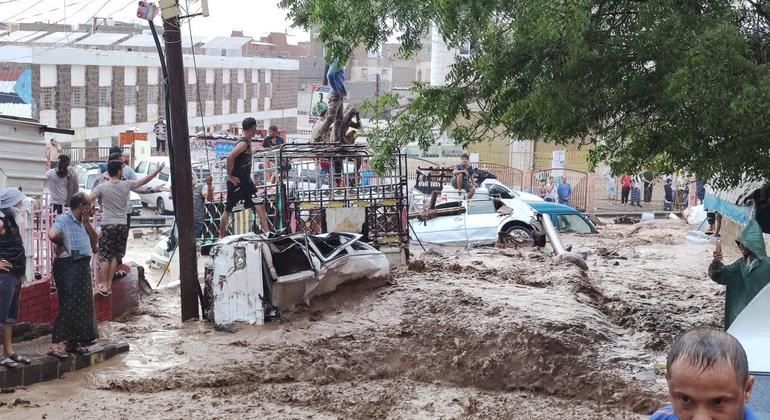The World Health Organization (WHO) has provided emergency assistance, in an urgent response to the needs of communities affected by floods in Yemen, the UN agency said on Wednesday.
In addition to health and laboratory supplies, it has supported specialized trauma teams and joined field missions along with national health authorities and other humanitarian partners.
“The risk of water- and vector-borne diseases, including malaria, cholera and other communicable diseases is unfolding,” warned Adham Rashad, WHO Representative to Yemen.
Evolving trauma
Triggered by the heavy seasonal rains, extensive floods have ravaged several governorates in Yemen since mid-July.
Tens of thousands of people have been affected so far, with more than 35,000 households impacted across 85 districts in 16 governorates, according to local authorities.
At least 77 people, including children, were killed in Al Bayda, Amran, Dhamar, Hajja, Ma’rib, and Sana’a governorates.
In addition, displacement sites and infrastructure – including water supply, public services, and private properties – were severely damaged.
On-the-ground-assistance
WHO has supported four specialized trauma teams and six on-duty ambulances, as well as set up 34 epidemiological early warning detection points in Ma’rib – one of the most affected governorates – where thousands of shelters for displaced families were destroyed.
Essential emergency health supplies were also released to the rapid response and emergency medical teams in Hajjah, Al Mahaweet, and Raymah governorates.
Along with its constant monthly supply of 144,600 litres of fuel to 11 hospitals, WHO worked with health authorities to prepare a comprehensive heavy rainfall and floods preparedness and response plan in Al Hodeidah governorate.
It has also provided the Central Public Health Laboratory with equipment and trained 25 laboratory technicians on the microscopic diagnosis of malaria.
Emergency aid
“With heavy rains expected to continue until the end of August 2022, we have scaled up our response to reach affected people and prevent any potential outbreak of these diseases,” said the WHO representative.
Additional cholera kits, IV fluids, rapid diagnostic tests for cholera, and supplementary modules of the interagency emergency health kit are under way. WHO continues to provide aid as the situation evolves.

